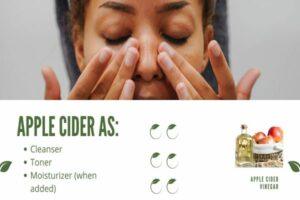Like most people, when I think of apple cider vinegar (ACV), the last thing that comes to mind is using it as a skincare treatment. I mean, come on, we all know that ACV is great for cleaning your house and getting rid of bad smells. But how effective or safe is apple cider vinegar for acne or the face?
Can it really help clear up acne?
And when it comes to sunburn and wrinkles, does ACV have any benefits?
Turns out, there may be some truth to the old wives’ tale that ACV is good for skin care after all! Keep reading to learn more about the potential benefits of apple cider vinegar for acne-prone skin.
See some therapeutic graded apple cider.
As an amazon associate, I earn from qualifying purchases. Full disclosure…
What is apple cider vinegar and what are its benefits

Apple cider vinegar is made from the juice of apples that have been fermented. The fermentation process produces a vinegar that is apple cider in color and has a sour taste.
Apple cider vinegar contains acetic acid, lactic acid, gallic acid, protocatechuic acid, and chlorogenic acid. These acids are believed to be responsible for the majority of apple cider vinegar’s health benefits.
Apple cider vinegar has been shown to have anti-inflammatory, antioxidant, antibacterial, and antifungal properties. It may also help improve blood sugar control and lower cholesterol levels.
When it comes to the skin, apple cider vinegar is most commonly used as a natural treatment for acne. It is thought to help clear acne by balancing the pH level of the skin and killing bacteria. It can also be used to reduce sunburns and wrinkles.
There are other natural home remedies (DIY) with green tea, cinnamon and honey, tea tree, aloe vera, and lemon juice. These ingredients have surprising DIY benefits for the skin.
How to use apple cider vinegar for acne-prone skin

If you’re looking to try apple cider vinegar for acne-prone skin, there are a few things you need to keep in mind.
First, it’s important to dilute apple cider vinegar with water before using it on your skin. You can start by mixing one part vinegar with three parts water.
You should also test apple cider vinegar on a small area of your skin before using it all over your face. Some people may experience a burning sensation when using apple cider vinegar on their skin. If this happens, discontinue use and consult a doctor.
Apple cider vinegar can be used as a cleansing agent, toner, and moisturizer. Here are some tips for using apple cider vinegar for acne-prone skin:
 As a cleansing agent:
As a cleansing agent:
Add one teaspoon of apple cider vinegar to your favorite facial cleanser or shampoo.
As a toner:
Mix one part apple cider vinegar with three parts water and apply to your face with a cotton ball. Leave on for 10 to 15 minutes and rinse with cool water.
As a moisturizer:
Because vinegar is acidic, it tightens the pores on your skin and makes it appear extremely glossy,” Robin (hair colorist from L’Oreal) points out.. That’s why he suggests combining vinegar with your body moisturizer. “It also gives a nice fragrance without the use of perfume.
You will find therapeutic graded apple cider on amazon
Remember, it’s important to start slowly when using apple cider vinegar on your skin. You can increase the frequency and concentration of your treatments as your skin becomes more tolerant.
If you experience any adverse reactions, discontinue use and consult a doctor.
How to use apple cider vinegar for wrinkles

Apple cider vinegar may also help reduce wrinkles. The acetic acid in apple cider vinegar has been shown to increase collagen production and reduce the appearance of wrinkles.
To use apple cider vinegar for wrinkles, mix one-part apple cider vinegar with two parts of water. Apply the mixture to your face with a cotton ball and leave it on for 10 to 15 minutes. Rinse with cool water.
You can also add one teaspoon of apple cider vinegar to your favorite facial cleanser or shampoo.
Be sure to start slowly when using apple cider vinegar on your skin, as some people may experience a burning sensation.
How to use apple cider vinegar for sunburns

Apple cider vinegar (ACV) may help as a home remedy for sunburns. It is said to help soothe the skin and promote healing. ACV is a rich source of lactic acid, gallic acid, protocatechuic acid, and chlorogenic acid.
These antioxidants may help reduce inflammation and promote healing.
To use ACV for sunburns, mix one-part ACV with three parts water. Soak a cloth in the mixture and apply it to the sunburned area. Leave the cloth on for 10-15 minutes. Repeat as needed.
Check out therapeutic graded apple cider on amazon
Additional ways to use apple cider vinegar for skin care

In addition to Apple cider vinegar being used for acne, wrinkles, and sunburn, here are a few ways to use apple cider vinegar for skin care:
As a facial scrub:
Mix one teaspoon of apple cider vinegar with one teaspoon of baking soda. Apply the mixture to your face and scrub gently. Rinse with cool water.
As a hair treatment:
Mix one cup of apple cider vinegar with one cup of water. pour the mixture over your hair, and let it sit for five to 10 minutes. Rinse with cool water.
As a foot soak:
Soak your feet in a bowl of warm water mixed with two tablespoons of apple cider vinegar.
Balancing pH levels of the skin:
Apple cider vinegar can be used to restore the pH balance of the skin. It is said to help remove excess oil and bacteria that can cause acne.
See some therapeutic graded apple cider.
The potential risks associated with using apple cider vinegar on the skin

Apple cider vinegar is a popular home remedy for a variety of skin conditions. However, there are some potential risks associated with using apple cider vinegar on the skin.
Apple cider vinegar is high in acetic acid, which can cause a burning sensation when applied to the skin. Additionally, apple cider vinegar can be harsh and drying, which may worsen acne and other skin conditions.
When used in excess, apple cider vinegar can also be toxic. It is important to start slowly when using apple cider vinegar on your skin and to increase the frequency and concentration of your treatments as your skin becomes more tolerant.
If you experience any adverse reactions, discontinue use and consult a doctor.
Related articles: there are other natural home remedies (DIY) with surprising benefits such as green tea, cinnamon and honey, tea tree, aloe vera, and lemon juice.
Conclusion
Apple cider vinegar is a popular home remedy for a variety of skin conditions. It is said to help remove excess oil and bacteria that can cause acne. Additionally, apple cider vinegar can be used to restore the pH balance of the skin, which may help improve acne symptoms.
However, there are some potential risks associated with using apple cider vinegar on the skin. Apple cider vinegar is high in acetic acid, which can cause a burning sensation when applied to the skin. Additionally, apple cider vinegar can be harsh and drying, which may worsen acne and other skin conditions. When used in excess, apple cider vinegar can also be toxic. It is important to start slowly when using apple cider vinegar on your skin and to increase the frequency and concentration of your treatments as your skin becomes more tolerant. If you experience any adverse reactions, discontinue use and consult a doctor.
Leave a message below if you have any other tips on how to use apple cider vinegar for skin care!
